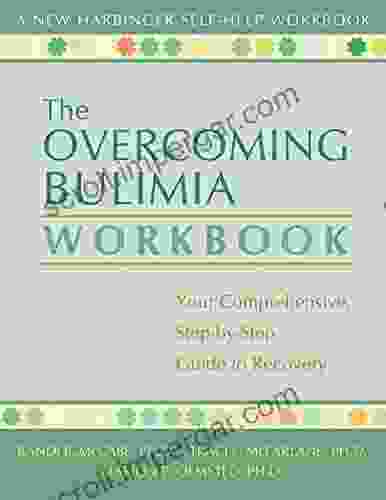Comfortably Numb: How Psychiatry Medicated a Nation, Exposing the Dark Underbelly of Psychiatric Drugs

In the wake of the opioid crisis, the use of psychiatric drugs has skyrocketed. Antidepressants, antipsychotics, and other psychotropic medications are being prescribed at alarming rates, with millions of Americans taking them on a daily basis. But what are the long-term consequences of these drugs? And are they really as safe and effective as we've been led to believe?
4.3 out of 5
| Language | : | English |
| File size | : | 824 KB |
| Text-to-Speech | : | Enabled |
| Screen Reader | : | Supported |
| Enhanced typesetting | : | Enabled |
| Print length | : | 306 pages |
In her groundbreaking book, Comfortably Numb: How Psychiatry Medicated a Nation, investigative journalist Julie Holland exposes the dark underbelly of psychiatric drugs. Holland, a practicing psychiatrist herself, delves into the history of psychotropic medications, their mechanisms of action, and their often devastating side effects.
A Brief History of Psychotropic Medications
The first psychotropic drugs were developed in the 1950s. Chlorpromazine, the first antipsychotic, was introduced in 1952, and imipramine, the first antidepressant, was approved in 1958. These drugs were hailed as miracle cures for mental illness, and they quickly became the go-to treatment for a wide range of psychiatric disFree Downloads.
In the decades since, the pharmaceutical industry has developed hundreds of new psychotropic medications. These drugs have become increasingly sophisticated and effective, and they are now used to treat a wide range of conditions, from depression and anxiety to schizophrenia and bipolar disFree Download.
The Dark Side of Psychotropic Medications
Despite their widespread use, psychotropic medications are far from harmless. In fact, they can have a wide range of serious side effects, including:
- Drowsiness
- Weight gain
- Nausea
- Constipation
- Blurred vision
- Dry mouth
- Sexual dysfunction
- Suicidal ideation
- Heart problems
- Birth defects
In some cases, these side effects can be life-threatening. For example, the antipsychotic drug clozapine has been linked to a rare but fatal blood disFree Download called agranulocytosis. The antidepressant paroxetine (Paxil) has been linked to an increased risk of suicide in children and adolescents.
The Overprescription of Psychotropic Medications
In addition to their side effects, psychotropic medications are also often overprescribed. One study found that nearly one in four Americans takes at least one psychiatric drug. And many of these people are taking multiple drugs, often for years or even decades.
The overprescription of psychotropic medications is a major problem for several reasons. First, it can lead to the development of side effects. Second, it can make it difficult to diagnose and treat underlying mental health conditions. And third, it can create a cycle of dependency, as people become reliant on these drugs to manage their symptoms.
The Need for Reform
The widespread use and overprescription of psychotropic medications is a serious public health problem. It is time for a major reform of the way we treat mental illness in this country.
We need to start by reducing the use of psychotropic medications. This means only prescribing them when they are truly necessary and using the lowest possible dose. We also need to do a better job of monitoring patients for side effects and discontinuing the use of drugs that are causing problems.
We also need to invest in research on new and more effective treatments for mental illness. This research should focus on developing non-drug therapies, such as psychotherapy and lifestyle changes. We also need to develop better ways to diagnose and treat mental health conditions so that we can avoid the need for medication in the first place.
The overprescription of psychotropic medications is a serious problem, but it is one that we can solve. By working together, we can create a more humane and effective mental health system for all.
Julie Holland's Comfortably Numb is a must-read for anyone who is concerned about the overuse and misuse of psychotropic medications. Holland exposes the dark underbelly of this industry and makes a compelling case for reform.
If you or someone you love is taking psychiatric medication, please talk to your doctor about the risks and benefits. And if you are concerned about the overuse or misuse of these drugs, please get involved in the effort to reform the mental health system.
About the Author
Julie Holland, MD, is a practicing psychiatrist and the author of the book Comfortably Numb: How Psychiatry Medicated a Nation. She is a graduate of the Yale School of Medicine and the Columbia University School of Public Health.
4.3 out of 5
| Language | : | English |
| File size | : | 824 KB |
| Text-to-Speech | : | Enabled |
| Screen Reader | : | Supported |
| Enhanced typesetting | : | Enabled |
| Print length | : | 306 pages |
Do you want to contribute by writing guest posts on this blog?
Please contact us and send us a resume of previous articles that you have written.
 Book
Book Novel
Novel Page
Page Chapter
Chapter Text
Text Story
Story Genre
Genre Reader
Reader Library
Library Paperback
Paperback E-book
E-book Magazine
Magazine Newspaper
Newspaper Paragraph
Paragraph Sentence
Sentence Bookmark
Bookmark Shelf
Shelf Glossary
Glossary Bibliography
Bibliography Foreword
Foreword Preface
Preface Synopsis
Synopsis Annotation
Annotation Footnote
Footnote Manuscript
Manuscript Scroll
Scroll Codex
Codex Tome
Tome Bestseller
Bestseller Classics
Classics Library card
Library card Narrative
Narrative Biography
Biography Autobiography
Autobiography Memoir
Memoir Reference
Reference Encyclopedia
Encyclopedia Caroline Alexander
Caroline Alexander Carol Caico
Carol Caico Frank Weinhold
Frank Weinhold Dave Anderson
Dave Anderson Carol Vernallis
Carol Vernallis Joel Spring
Joel Spring Michael G Uva
Michael G Uva Carin Thomas
Carin Thomas Paul E Hoffman
Paul E Hoffman Carla Willig
Carla Willig Cam Rea
Cam Rea Carmen Gloria
Carmen Gloria Mark Schnubel
Mark Schnubel Catherine H Zuckert
Catherine H Zuckert Johnhenry Gonzalez
Johnhenry Gonzalez Jacqueline Simon Gunn
Jacqueline Simon Gunn Julius Evola
Julius Evola Cemone Rowe
Cemone Rowe Carl Benn
Carl Benn Carole Heaney
Carole Heaney
Light bulbAdvertise smarter! Our strategic ad space ensures maximum exposure. Reserve your spot today!

 David BaldacciStories and Poems from Oakville, Alabama: A Journey Through History, Culture,...
David BaldacciStories and Poems from Oakville, Alabama: A Journey Through History, Culture,...
 Stuart BlairPrepare Your Heart for a Roller Coaster of Emotions with "Heart Wrenching And...
Stuart BlairPrepare Your Heart for a Roller Coaster of Emotions with "Heart Wrenching And...
 William PowellThe History and Future of Narragansett Bay: Unraveling the Story of a Coastal...
William PowellThe History and Future of Narragansett Bay: Unraveling the Story of a Coastal... Matthew WardFollow ·17.9k
Matthew WardFollow ·17.9k Cruz SimmonsFollow ·5.4k
Cruz SimmonsFollow ·5.4k Chadwick PowellFollow ·5.4k
Chadwick PowellFollow ·5.4k Samuel Taylor ColeridgeFollow ·13k
Samuel Taylor ColeridgeFollow ·13k Julian PowellFollow ·2.6k
Julian PowellFollow ·2.6k Junot DíazFollow ·4.1k
Junot DíazFollow ·4.1k Abe MitchellFollow ·19.5k
Abe MitchellFollow ·19.5k John GrishamFollow ·3.1k
John GrishamFollow ·3.1k

 Henry Hayes
Henry HayesVery Short Introductions: A Gateway to Knowledge...
In the realm of academia, where vast oceans of...

 Jean Blair
Jean BlairBorn on the Third of July: An Unforgettable Journey of...
Born on the Third...

 Benjamin Stone
Benjamin StoneEnvironmental Offsets: Striking a Balance between...
In the face of pressing environmental...

 Colin Foster
Colin FosterGirl With Power: My Boyhood Bully Diary
In this gripping and...

 Colin Foster
Colin FosterUnveiling the Unseen: The Collected Works of Charles Fort
Prepare to venture into...

 Gabriel Mistral
Gabriel MistralUnveiling the Hidden World of the English Republican...
Dive into the captivating world of 'The...
4.3 out of 5
| Language | : | English |
| File size | : | 824 KB |
| Text-to-Speech | : | Enabled |
| Screen Reader | : | Supported |
| Enhanced typesetting | : | Enabled |
| Print length | : | 306 pages |






